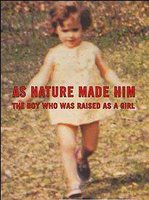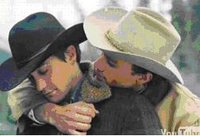
My last post about gender prompted some interesting comments, and
Darlene brought up the story of David Reimer, whose penis was severely burned in a surgical accident when he was eight months old. The doctor advised his parents to have him reassigned as female and be raised as a girl. His case (and the doctor was very happy to discover that he had a built in control for his experiment with "Brenda" being an identical twin to his brother Brian) was used to "prove" that gender was learned behaviour. In the "nature vs nurture" debate, nurture was deemed to have won, and this theory was the basis for reassignment of many, many children. (David's case was the first of reassignment of a child born with normal genitals.) When David learned that, he was so concerned for the sake of these children that he finally came out into the open to tell his story. There is a lot of information out there on the case, but
this is a good summary of the important facts.
This post is in response to
Q's comment:
David's story touches on some of the same issues Chosha has raised. He felt male and he couldn't accept who he was even though he had been raised as a girl. Does this undermine Chosha's argument, that it doesn't matter which sex we feel like?
Actually, that's not quite the argument I'm making. What I'm saying is that for a boy, "feeling like a girl" may simply be, in reality, feeling drawn to things outside your stereotype. If someone asked me whether or not I feel like a woman, I would have to ask them to first define what they mean by that. It's an easy question for me to answer if I don't care to understand what they think I'm agreeing to, but I think that question would always prompt me to ask, because there isn't one definition of "woman" that I know for sure they must be referring to. (And it would irritate me if they believed there was!)
Consider this quote from the link above:
The transformation became internationally renowned as "the John/Joan case." Dr. Money’s research was offered as proof positive that sexual identity was learned behavior. He declared, "The child's behaviour is so clearly that of an active little girl and so different from the boyish ways of her twin brother."
...Behind the scenes, Reimer's mother told Money that Brenda ripped off dresses, rejected dolls, insisted on standing up to urinate, and asked to shave like her father. Nevertheless, Money’s 1972 book Man and Woman, Boy and Girl declared the experiment to be a success.

What I am arguing is that ripping off dresses and rejecting dolls doesn't make you a boy. It's easy to argue in David's case that this was his inherent 'boyishness', because he was biologically born a boy. But where does that leave girls who rebel against girlie stuff? If "Brenda" had been born a girl, these things would not have proved she was "really a boy inside". The urinating standing up I can't comment on (not all men do it, and this boy had no penis to urinate with, so I can't imagine why it seemed more comfortable), but the shaving incident doesn't surprise me at all. David was 22 months old when he was reassigned as a girl. Up until then his parents had treated him and his brother exactly the same. After the surgery they consciously 'treated him like a girl', including behaviours like telling him to not get dirty, or expecting better manners from him, giving him "girls' toys". He might not have been old enough to really comprehend the boy/girl switch, but he was certainly old enough to sense that he was suddenly being treated very differently to his twin. Brian was allowed, encouraged even, to mimic his father shaving, while 'Brenda' was told no, girls didn't do that. Of course he was upset and wanted to shave - not because it was a 'boy' thing to do, but because he was being excluded in a way he had not been before.
Just the other day I read another story of a man living as a woman and the same pattern was there. He likes dolls, but was denied them, even to play with temporarily at child care. At school the girls coloured a butterfly, the boys a sports figure, and again he was not allowed to choose the "girls' picture". Many incidents like this occurred. Throughout school he was bullied and teased for liking things like unicorns, babies, etc. He was also ridiculed for not having a strong upper body. Basically his friends were all girls, the only adults who supported him were women, and the boys at school and at church beat him up pretty much constantly throughout his school years. Everything he enjoyed was denied, and he was constantly expected to fill roles he felt uncomfortable with. When a childhood friend explained that she would grow up to be a woman, and he would grow up to be a man "like her father" all he could think about was that her father deserted his family periodically and was known to hit them.
Is it really any wonder that this boy started to fantasize about being a girl? If he had been a girl it would have been expected for him to act as he did, want the things he wanted. Other people would have treated him as he wanted to be treated, responded to him and his personality as if it were normal,

expected. But this should already be the case! In a world where rigid gender roles were not mistaken for gender, it would already be acceptable (or at least more tolerated), and people would have the flexibility to respond to such pronounced difference from 'the norm' with little more than surprise.
I find it interesting that people more and more are starting to have a 'whatever floats your boat' attitude towards the gay community, yet are still so rigid about straights breaking down gender roles. It's as if being gay provides an acceptable reason for their non-stereotypical behaviour in regard to gender roles. Why remain so uptight about gender in general? Are they worried about their own sense of identity and how much of it is defined by the gender roles they fulfill?
(In case anyone is wondering, the girl with the basketball is a singer called ToMBoy, and the pretty man in the red dress is a Japanese rocker named Mana.)
 This actually happened back on the 19th. I was writing a reply comment on this post, and couldn't remember if the French phrase was menage e trois, or menage a trois. I've seen both, and I'm not sure what the difference is, but either way I couldn't remember. The following conversation was then called out between his room and mine:
This actually happened back on the 19th. I was writing a reply comment on this post, and couldn't remember if the French phrase was menage e trois, or menage a trois. I've seen both, and I'm not sure what the difference is, but either way I couldn't remember. The following conversation was then called out between his room and mine: me: Phi, is the little word in the middle of menage a trois an 'a' or an 'e'?
phi: Are you writing a new profile?













































